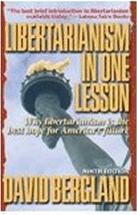

 |  |
Libertarianism in One Lesson
|
Please go to the new Coffee Coaster site implemented more gracefully in Wordpress. This page @ http://brianrwright.com/CoffeeCoasterBlog/?p=3346 |
 Mr. Bergland's concise, logical, and benevolent book—first edition published in 1984—on the nature of liberty, libertarianism, and the modern libertarian movement has become a classic. Properly so. Like most classics in the field, it is well worth consulting repeatedly by liberty activists—as well as being placed in easy reach on our bookshelves for handing to those yet innocent of the principles of freedom.
Mr. Bergland's concise, logical, and benevolent book—first edition published in 1984—on the nature of liberty, libertarianism, and the modern libertarian movement has become a classic. Properly so. Like most classics in the field, it is well worth consulting repeatedly by liberty activists—as well as being placed in easy reach on our bookshelves for handing to those yet innocent of the principles of freedom.
David Bergland was the Libertarian Party's (LP's) presidential candidate in 1984... also the Party's vice-presidential candidate in 1976. Mr. Bergland produced Libertarianism in One Lesson after that campaign, and as I recall came up with new editions every year or two thanks to the everchanging political landscape. The book shows a higher regard for the Party's value than many in the freedom movement would assert, but the author certainly doesn't place the LP center stage. More recently, David joined forces with Marshall Fritz in a liberty promotional organization called Advocates for Self Government, now changed to simply the Advocates.
The Advocates is noteworthy for popularizing the Nolan Chart, a meaningful political spectrum created by David Nolan, founder of the Libertarian Party. Libertarianism in One Lesson has a complete chapter on the Nolan Chart and the rationale for using it instead of the rather meaningless left-right axis for assessing where a society lies politically. Shown above is the latest 8th edition (2005); I'm reviewing the 6th edition (1993). The material that changes pertains mainly to the bigger issues or events of the day, such as the 1993 reference to the fall of the Berlin Wall in 1989 and the 2005 edition focusing more strenuously on noninterventionist foreign policy—thanks to the 9/11/2001 Attacks and the US aggression on Iraq and Afghanistan.
There is something calming and peaceful in the manner David lays out his simple lessons for liberty and libertarianism. Nothing radical sounding or falsely alarming, just, "let's sit down and think about this as adults." He starts with first principles; doesn't pull any punches: under Chapter 1: The Nature of [Coercive] Government the author gives it to you straight... that what we're dealing with is physical force:
"When anyone says that 'there ought to be a law,' or the government ought to take action,' what they are saying is that legislators should make certain rules, attach penalties to them, and if people do not comply, men with guns should enforce compliance by imposing criminal penalties on anyone who has broken a rule."
He follows with two chapters that talk about noncoercive alternatives to government and obstacles to clear thinking when we consider what government is and ought to be. Here Mr. Bergland talks about the Utopian Fallacy and the 'PANG' (People Are No Good) theory: respectively, that any political system one proposes has to achieve perfection in outcome and that freedom doesn't work because people are not sufficiently smart of moral. In my own Module #2: Nonaggression 101 of the Sacred Nonaggression Principle I pay homage to Mr. Bergland's PANG arguments just as I make my case for the four cornerstones of the nonaggression principle:
Once you have grasped the essence of the concept of nonaggression—sometimes formulated as the Principle of Individual Rights, or simply Liberty—a lot of the arguments for public policy fall immediately into place. Still for the uninitiated it's important to talk about such public issues in practical terms, which is what Mr. Bergland does in the remaining chapters (after discussing the context of libertarianism in America in chapters 4-6):
Then the conclusion, with some highly stimulating references to other books and libertarian organizations. Having spent just over 100 pages of reasonably sized print David Bergland has made one of the more succinct and efficient statements of libertarian principle and practice that one will see. It works for those of us who have been active in the freedom movement, but far better for the "common man" just getting his/her feet wet.
I had some personal contact with David Bergland in my early days of the Libertarian Party: the first time was at the spectacular Bonaventure Hotel in Los Angeles at the 1979 Libertarian Party Presidential Nominating Convention. Such a promising political event, we were young and hopeful that our nominee Ed Clark would set the world on fire. After the dinner one night, my wife and I were outside on the deck enjoying a cigarette—smoking (tobacco) wasn't a felony then—and Mr. Bergland dropped by our table. As I recall, David was the chairman of the convention, responsible for ensuring the business ran smoothly and according to Roberts Rules of Order. Rose and I both commented on what a fine and thankless job he was doing.
He was engaging and courteous, it was simply a splendid mellow sort of evening that I remember to this day, thinking Mr. Bergland an effective, warm Libertarian leader—he was also running for LP US Senate that year—one among many. "There's no way with competent, caring people like this that we won't see freedom in our time!" I bring this up now because in retrospect, despite any differences I may have had long ago with his turn at LP leadership, he's the perfect author for this book... and this book is the perfect introduction for the serious libertarian (or Libertarian) prospect. The ending to his preface to the Sixth Edition puts it as it should be:
... My sincere hope is you will question every idea presented here, and every idea you have learned about political philosophy elsewhere, and thus be stimulated to investigate further. Because I am a libertarian, my confident view is that the more free and open inquiry there is into these issues, the closer we will come to that most desirable state of affairs in which both you and I will be respected and appreciated as the unique and competent individuals we are.
###
2011 February 11
Copyright © Brian Wright | The Coffee Coaster™
David Bergland | Libertarianism in One Lesson | The Advocates | LP
###
| Publish Fee: $25 Donation |  |
Please donate $1 for download of PDF | ||